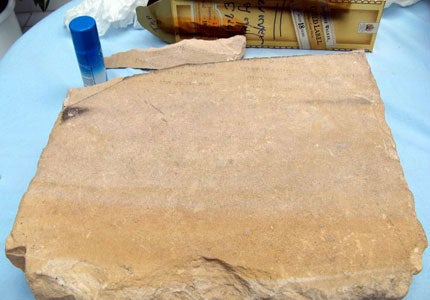Hebrew tablet 'predates Bible on resurrection'

A pre-Christian Hebrew text shows that the idea of a messiah rising from the dead after three days was already in Jewish tradition before the birth of Jesus, a prominent biblical scholar will argue today.
The controversial theory of Professor Israel Knohl, citing his new reading of a tablet inscribed in the 1st century BC discovered nearly 10 years ago, is expected to trigger a new Judaeo-Christian debate over the meaning and origin of the most central tenet of Christianity, the death and resurrection of Jesus.
Professor Knohl, a professor of biblical studies at Hebrew University, Jerusalem, will unveil his interpretation of the text at an Israel Museum conference of scholars, saying that it quotes the Archangel Gabriel telling an earlier "Prince of Princes" that: "In three days you shall live, I Gabriel, command you."
Using other lines in the text that refer to blood and slaughter as routes to righteousness, along with the overall context of the Jewish revolt against the Romans at the time, Professor Knohl suggests that it refers to the death and resurrection of a Jewish leader.
The tablet, known as Gabriel's Vision of Revelations because it contains an apocalyptic text ascribed to the angel, has attracted the intense interest of scholars. It came to light after it was bought from a Jordanian antiquities dealer by an Israeli-Swiss collector, David Jeselsohn, who kept it in his Zurich home. The location of the original discovery is not clear, though it may have been in Jordan on the eastern shore of the Dead Sea.
Two Israeli scholars, Ada Yardeni and Binyamin Elitzur, published a detailed analysis of the Hebrew script, which is written rather than engraved in the stone, last year, dating it towards the end of the first century BC. But when it came to the crucial line 80 in the script, which clearly begins "in three days", the scholars concluded that the next word was illegible.
Professor Knohl argues that the word is "Hayeh" or "live" in the imperative. He goes on to outline his conjecture that the messianic figure could be a rebel leader against the Roman-backed monarchy of Herod named Shimon, who the historian Josephus says was killed by one of Herod's military commanders.
He will claim today that the interpretation vindicates a theory which he had already expounded in a book in 2000, namely that the idea of a suffering messiah existed before Jesus.
Claiming that the idea that Jesus died to redeem the sins of all mankind was in large part generated by St Paul, who wanted Jesus to be a messiah "of the gentiles", he said yesterday that the earlier Jewish tradition would have seen his death as necessary "to cause God to defeat the enemy, to liberate Jerusalem from the Roman occupation". He added: "He was fighting for the liberty of the Jewish people. That is how I see it."
Not all scholars at today's conference are likely to be convinced, however. Professor Lawrence Schiffman, Professor of Hebrew and Judaic Studies at New York University, said that a single detail of a "phenomenal" text was being used to create a "media experience".
He said the text was being restored to "say something which it may or may not say" and that more comprehensive study was needed to relate it to "the very complex history of the development of religion in antiquity". He added that Jesus was the "victim of sensationalism all the time".
Join our commenting forum
Join thought-provoking conversations, follow other Independent readers and see their replies
Comments
Bookmark popover
Removed from bookmarks